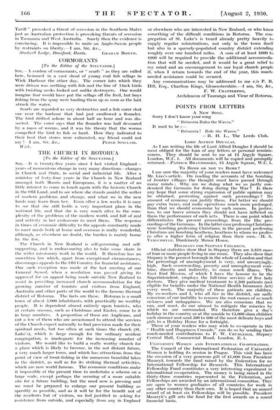THE CHURCH IN ROTORUA
[7'o the Editor of the SencrAroa.]
Sut,—It is twenty-five years since I last visited England— years of momentous change in very many directions—changes in Church and State, in social and industrial life. After a ' • tr. of forty-four years in the Church in New Zealand amongst both Maoris and Europeans, it is a matter of no little interest to conic in touch again with the historic Church in the Old Land, and to see where she stands amidst the welter of naxlern problems and change, and what we in the new lands may learn from her. Even after a few weeks it is easy to see that she still holds a very important place in the
national life, and that she is very 11 alive to the com- plexity of the pmblems of the modern world, and full of zeal and activity in her endeavour to meet them. The response in times of economic difficulty to the appeals constantly made to meet needs both at home and overseas is really wonderful, although, as elsewhere no doubt, the burden is mainly borne by the few.
The Church in New Zealand is self-governing and self- supporting, and is endeavouring also to take some share in the wider missionary work in the world. It therefore has an unwritten law which, apart from exceptional circumstances, discourages appeals to the Old Country for financial assistance. One such exception was made at the last meeting of our General Synod, when a resolution was passed giving its approval for an appeal being made outside New Zealand to assist in providing increased church accommodation for the growing number of tourists and visitors from England, Australia and other parts of the world to the famous thermal district of Rotorua. The facts arc these. Rotorua is a small town of :Moat .3,000 inhabitants, with practically no wealthy people. It is dependent almost entirely upon tourists, who at certain seasons, such as Christmas and Easter, come to it in large numbers. A proportion of these are Anglicans, and not a few of them who are accustomed to attend the services of the Church expect naturally to find provision made for their spiritual needs, but too often at such times the church (St. Luke's), which is large enough for the ordinary resident congregation, is inadequate for the increasing number of visitors. We would like to build a really worthy church for a place which is likely to become, in the not distant future, a very much larger town, and which has attractions from the point of view of trout-fishing in the numerous beautiful lakes in the district, as well as for its striking thermal activities, which are now world famous. The economic conditions make it impossible at the present time to undertake a scheme on a large scale, except perhaps the securing of a more suitable site for a future building, but the need now is pressing and we must be prepared to enlarge our present building as speedily as possible, and as it will be for the benefit not of the residents but of visitors, we feel justified in asking for assistance from outside, and especially from any in England or elsewhere who are interested in New Zealand, or who know something of the difficult conditions in Rotorua. The con- gregation of St. Luke's is taxed already pretty heavily to supply regular ministrations, not only in the town itself but also in a sparsely-populated country district extending roughly over one hundred miles. A sum of at least £600 to £800 will be required to provide the additional accommoda- tion that will be needed, and it would be a great relief to my mind and an encouragement to our loyal church people if, when I return towards the end of the year, this much- needed assistance could be secured.
Any communications may be addressed to me c/o P. R. hill, Esq., Charlton Kings, Gloucestershire.—I am, Sir, &e.,
F. W. CHATTERTON,
Archdeacon of Tauranga and Vicar of Rotorua.
































 Previous page
Previous page